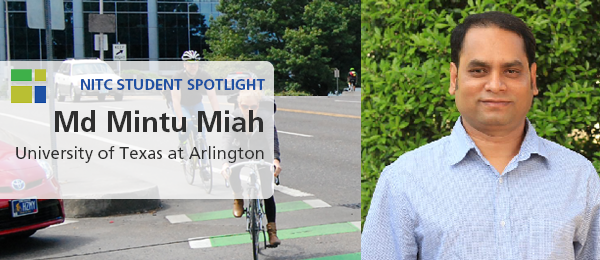Student Spotlight: Md Mintu Miah, University of Texas at Arlington

Md Mintu Miah is a Ph.D. student and research assistant in transportation engineering at the University of Texas at Arlington. He is interested in data mining and machine learning in the field of transportation engineering. He obtained his MS in transportation engineering from the University of Hawaii at Manoa, and BS in civil engineering from Bangladesh.
Tell us about yourself?
Md Mintu Miah was born in 1989 in a small village of Bangladesh. He obtained his Bachelor Degree on Civil Engineering from Rajshahi University of Engineering & Technology (RUET), Bangladesh in 2012. In the year 2014, he joined as a full-time lecturer in the same department and worked until 2017. Later, he obtained his Master's degree in Transportation Engineering from the University of Hawaii at Manoa, USA (2018). Currently, he is working as a Ph.D. student and Graduate Research Assistant of Transportation Engineering at the University of Texas at Arlington, USA under the supervision of Professor Stephen P. Mattingly.
What (or who) has influenced your career path in transportation?
The destitute transportation system of my own country and ample research opportunity in the U.S. have jointly influenced me to study in the field of Transportation Engineering. Initially, I was encouraged by my family, colleagues; later, this dream came robustly true by conducting a research-based MS on Transportation Engineering. Now, I have engaged myself to solve the critical transportation issues in the U.S. with the endless guidance of my Ph.D. supervisor Dr. Mattingly and co-supervisor Dr. Kate Hyun. They are playing a great role to guide me and making me a more accomplished thinker and problem solver.
You've been working on the NITC pooled fund project Exploring Data Fusion Techniques to Derive Bicycle Volumes on a Network Bike Data Fusion—Tell us about your work on it?
I am working as a Research Assistant on a NITC funded Project titled “Exploring Data Fusion Techniques to Derive Bicycle Volumes on a Network.” The aim of this research is to estimate a network AADBT using bike fusion data from Portland, Oregon in 2019. I have already developed statistical models to predict the bicycle volume utilizing static variables (shared bike lane, speed limit, and percentage of white population), and weather-temporal variables (average temperature, humidity, precipitation, and weekend) where inductive loop detectors data have been used. The next step has dealt with emerging technological data from Strava to create better-performing models. In the extension of this research, a machine learning algorithm will be used for clustering and classification. The clustering and classification method trains the inherent associations of independent variables without predetermined assumptions based on the spatial and temporal patterns of bicycle activities and other variables to minimize the sampling bias in Strava counts and generate a representative grouping measure for network links. The modeling outcome estimates the AADBT on a network level and captures the temporal and spatial variations of bicycle volumes over a large network. The developed model provides an insight for stakeholders on how to use emerging technologies and advanced modeling techniques for bicycle data collection and AADBT estimation.
After graduation, what future work do you envision doing in transportation?
After completing my Ph.D., I am highly interested in working as a research scientist in the field of transportation engineering, either in a university research center or in a research laboratory. My vision is to conduct research on futuristic problems with super complex transportation, especially issues related to transportation operations and planning, using more advanced technological supports and machine learning algorithms. As the data collectors dominate the research, I believe that the U.S. has the best transportation data collection technology of any other country, which will expand my research scope in the U.S. In the near future, I want to see myself as an expert in the field of transportation and want to keep continuing my contribution to U.S. transportation system as well as to the world through my research and practical implementation of projects.
This is an installment in a series of monthly Student Spotlights we're shining on students and alumni that are involved with National Institute for Transportation & Communites (NITC) universities. NITC is a university transportation consortium funded by the U.S. DOT, and is a Portland State-led partnership with the University of Oregon, Oregon Institute of Technology, University of Utah, University of Arizona, and University of Texas at Arlington.
